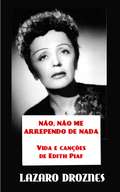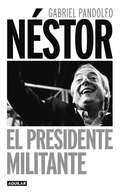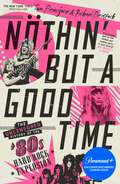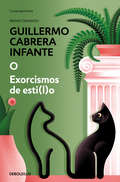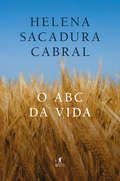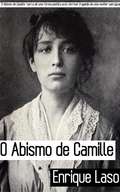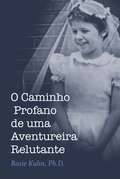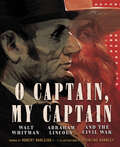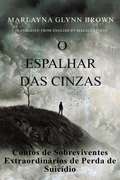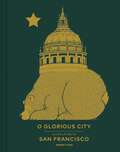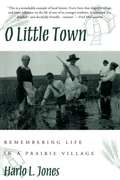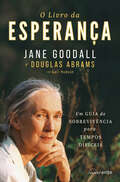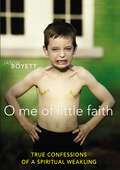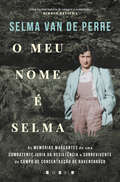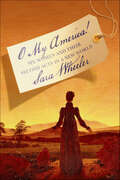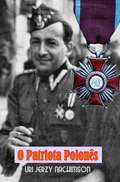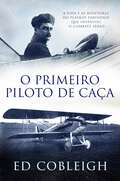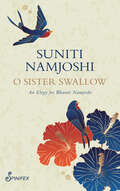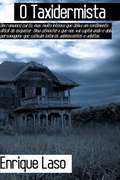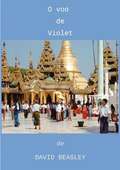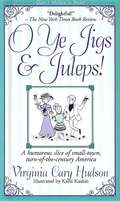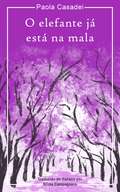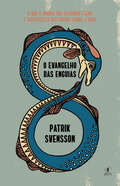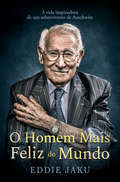- Table View
- List View
Não,Não me arrependo de nada
by Lázaro DroznesO livro fala de acontecimentos onde não há arrependimentos de nada doque aconteceu.
Néstor. El presidente militante
by Gabriel PandolfoLa biografía del primer presidente militante de la Argentina. Néstor, el presidente militante recorre la vida del gobernante más valioso que tuvo la Argentina en las últimas décadas, examina los puntos decisivos de su gestión de gobierno y se interna en su psicología, revelando las motivaciones personales y sociales que hicieron de él una figura paradigmática. Con una prosa atrapante, que se lee como una novela, Gabriel Pandolfo va de lo público a lo privado y no deja tema sin tocar. Recorre sus comienzos como militante universitario en la ciudad de La Plata y simpatizante de Montoneros, cuando algunos de sus compañeros llegaron a pensar en asesinarlo; su romance y matrimonio con Cristina; su ascenso inesperado desde la gobernación de Santa Cruz hasta la presidencia. Su relación con los militares. Los derechos humanos. El enfrentamiento con Clarín. Las sospechas de enriquecimiento ilícito. Pero más allá de toda enumeración, el autor pone a la luz el gran sueño de Néstor Kirchner, el sueño que también hizo soñar a la Argentina. Néstor, el presidente militante cuenta toda la verdad, las contradicciones y debilidades de un gran hombre, ese que cambió nuestra historia.
Nöthin' But a Good Time: The Uncensored History of the '80s Hard Rock Explosion
by Tom Beaujour Richard BienstockNow streaming on Paramount+ as an exclusive docuseries!The New York Times BestsellerThe Explosive National Bestseller"A backstage pass to the wildest and loudest party in rock history—you'll feel like you were right there with us!" —Bret Michaels of PoisonNothin' But a Good Time is the definitive, no-holds-barred oral history of 1980s hard rock and hair metal, told by the musicians and industry insiders who lived it. Hard rock in the 1980s was a hedonistic and often intensely creative wellspring of escapism that perfectly encapsulated—and maybe even helped to define—a spectacularly over-the-top decade. Indeed, fist-pumping hits like Twisted Sister’s “We’re Not Gonna Take It,” Mötley Crüe’s “Girls, Girls, Girls,” and Guns N’ Roses’ “Welcome to the Jungle” are as inextricably linked to the era as Reaganomics, PAC-MAN, and E.T.From the do-or-die early days of self-financed recordings and D.I.Y. concert productions that were as flashy as they were foolhardy, to the multi-Platinum, MTV-powered glory years of stadium-shaking anthems and chart-topping power ballads, to the ultimate crash when grunge bands like Nirvana forever altered the entire climate of the business, Tom Beaujour and Richard Bienstock's Nothin' But a Good Time captures the energy and excess of the hair metal years in the words of the musicians, managers, producers, engineers, label executives, publicists, stylists, costume designers, photographers, journalists, magazine publishers, video directors, club bookers, roadies, groupies, and hangers-on who lived it. Featuring an impassioned foreword by Slipknot and Stone Sour vocalist and avowed glam metal fanatic Corey Taylor, and drawn from over two hundred author interviews with members of Van Halen, Mötley Crüe, Poison, Guns N’ Roses, Skid Row, Bon Jovi, Ratt, Twisted Sister, Winger, Warrant, Cinderella, Quiet Riot and others, as well as Ozzy Osbourne, Lita Ford, and many more, this is the ultimate, uncensored, and often unhinged, chronicle of a time where excess and success walked hand in hand, told by the men and women who created a sound and style that came to define a musical era—one in which the bands and their fans went looking for nothin’ but a good time…and found it.
O / Exorcismos de esti(l)o
by Guillermo Cabrera InfanteDos libros experimentales reunidos en un volumen en el que brilla el inigualable talento lúdico de Guillermo Cabrera Infante En este volumen conviven dos libros próximos en el tiempo de Guillermo Cabrera Infante: la colección de artículos y ensayos O, publicada originalmente en 1975, y el libro de piezas experimentales Exorcismos de esti(l)o, aparecido en 1976. En el primero, el autor despliega su peculiar ingenio creador, en ocasiones satírico y burlón, para describir facetas de su cotidianidad y de la vida contemporánea, haciendo referencia a protagonistas tan diversos como su inigualable gato Offenbach y los miembros de la policía secreta. En Exorcismos, una colección repleta de saber clásico y sarcásticas investigaciones literarias, brilla el talento lúdico del Cabrera Infante, así como su obsesión por las sorpresas del lenguaje, plasmada en una serie de retruécanos, juegos de palabras multilingües e ingeniosas manipulaciones tipográficas que evocan a e.e. cummings y al OuLiPo. La crítica ha dicho:«Guillermo Cabrera Infante era un grandísimo escritor.»Mario Vargas Llosa «Uno de los mayores y mejores renovadores de la prosa en castellano, un clásico de vanguardia.»Fernando Savater «Su talento verbal era extraordinario, tanto de viva voz como por escrito, aunque esto último lo sepa cualquiera que haya leído sus libros.»Javier Marías «Cabrera Infante trajo al sector desarraigado a la fuerza de Cuba las virtudes de la parodia, la sátira y el humor.»José Miguel Oviedo, Letras Libres
O ABC da Vida
by Helena Sacadura CabralO novo livro de Helena Sacadura Cabral. Um abecedário vivo daquilo que somos e fazemos, onde o essencial é possível e a alegria de viver, regra. Da amizade à esperança, da gratidão à fé, passando pela paciência e pela justiça… São muitos os pequenos prazeres que nos preenchem os dias, mas são preciosos e necessários os valores que guiam a nossa acção e nos ajudam a desfrutar plenamente do nosso tempo connosco e com os outros. Eterna amante da vida e indefectível optimista, Helena Sacadura Cabral partilha aqui a sua forma de estar no mundo através deste «abecedário vivo daquilo que somos e fazemos», onde o essencial é possível e a alegria de viver, regra. «Na alegria nada é obrigatório. Não pressupõe oportunidades aproveitadas, locais especiais ou uma determinada duração. É o momento que se vive, que se sente, e tanto pode durar breves segundos, como prolongar-se numa sensação duradoura de bem-estar, que é a natureza da sua essência. Pessoalmente, entendo a alegria como uma boa gargalhada, uma sensação de prazer provocada por um raio de sol, o arrepio do início do Outono.»
O Abismo de Camille
by Ana Claudia Antunes Enrique Laso"O Abismo de Camille" é um diário. Através das palavras, cheias de culpa, de Edouard Faret, diretor do centro psiquiátrico de Montdevergues, iremos abordar a vida de Camille Claudel, uma mulher excepcional. Camille foi uma escultora incomparável e amante de Rodin, que procurou em um mundo de homens (no final do século XIX) fazer um nome, fama e prestígio que seu trabalho merecia. Ela não teve êxito. Em 1913, após a morte de seu pai que tanto a amava, ela foi internada à força em um hospício por sua própria família. Permaneceu ali por trinta anos, durante os quais ficou presa contra a sua vontade, até sua morte, embora os médicos e alguns parentes sabiam perfeitamente bem que ela não estava louca. "O Abismo de Camille" narra de uma forma poética esta terrível tragédia de uma mulher sem igual, uma artista brilhante que teve uma existência marcada pelo destino. Pela primeira vez um autor discorre sobre os anos de internamento de Camille, uma época um tanto sombria e anteriormente revista somente com alguma profundidade. É a mais profunda e relevante novela que Enrique Laso gerou até o momento. Nela conseguiu transmitir e transmutar sua admiração por Camille, enquanto vem da sua ira em um mundo que por inúmeras vezes se mostra injusto. Um mundo em que os miseráveis podem acabar ganhando...
O Caminho Profano de uma Aventureira Relutante
by Dr Rosie KuhnNem em um milhão de anos eu sonharia com essa minha vida. Quando criança, tudo o que eu imaginava era que iria me casar o mais cedo possível, ter filhos e viver feliz para sempre. Fim da história. Alguém - eu não sei quem, deve ter me amaldiçoado; aquele que disse: "Que você tenha uma vida interessante". Por que mais uma boa garota católica acabaria tendo uma vida como essa? O que levaria a filha de um médico do centro-oeste a fazer o tipo de escolha que eu fiz? Escolher uma vida como mãe não-custodial de bebês, atravessando o Oceano Atlântico em uma escuna de 28 metros, adquirindo três diplomas de mestrado e um PhD e escrevendo um livro sobre autocapacitação... O que aconteceu com o meu sonho de ser uma mãe feliz brincando com meus filhos? Tenho certeza de que foi uma maldição.Raramente somos capazes de entender o desenrolar de nossa própria história até aproveitarmos a oportunidade para olhar para trás e testemunhar.
O Captain, My Captain: Walt Whitman, Abraham Lincoln, and the Civil War
by Robert BurleighThis beautifully illustrated children’s book explores how Walt Whitman was affected by the Civil War and inspired by President Lincoln.O Captain, My Captain tells the story of one of America’s greatest poets and how he was inspired by one of America’s greatest presidents. Whitman and Lincoln shared the national stage in Washington, DC, during the Civil War. Though the two men never met, Whitman would often see Lincoln’s carriage on the road. The president was never far from the poet’s mind, and Lincoln’s “grace under pressure” was something Whitman returned to again and again in his poetry. Whitman witnessed Lincoln’s second inauguration and mourned along with America as Lincoln’s funeral train wound its way across the landscape to his final resting place. The book includes the poem “O Captain! My Captain!” and an excerpt from “When Lilacs Last in the Dooryard Bloom’d,” as well as brief bios of Lincoln and Whitman, a timeline of Civil War events, endnotes, and a bibliography.
O Come Ye Back to Ireland: Our First Year In County Claire
by Niall Williams Christine BreenTwo years ago Niall Williams and his wife, Christine Breen, abandoned their urban careers and paychecks and their many comforts to return to the rugged, rural life of their ancestral Ireland. They emigrated back to the land of their forefathers. Answering a sentimental longing to reconnect to the place of their origin, they booked one-way tickets, pooled and budgeted savings, and bundled up their worldly possessions. Niall would write, Christine would paint, and they would soon grow produce and maintain live-stock. The town they settled near was the village of Kilmihil, 12 miles from the sea, on Ireland's western coast. The place is damp, gray and utterly beautiful. The house, her great grandfather's cottage is heated only by turf which Niall must learn to cut from the nearby bogs and burn in the open fireplace. There is no telephone, no chain saw. There are no restaurants, cinemas, subways, cities or sounds other than the wind, the rain and the jackdaws. Christine sets upon the overgrown garden, salvaging the flowers from among the weeds. The garden, she realizes, was first put in by her great grandfather 200 years earlier. Though the skies rain for an entire summer, she manages to paint and even teach aerobics to the local ladies, as she also strives to earn the welcome she finally receives as Jack O'the Grove's granddaughter.Niall learns to kill a chicken, rids the house of a hoard of bees, finds the burial grounds of a mythical giant and ultimately takes a course to learn to be a farmer. Together Niall and Christine brought the farmland of Kiltumper back to life and together they have written this journal, delightfully illustrated with Christine's art. Niall and Christine first met at University College in Dublin, the city where Niall was born and raised. Christine was born in New Jersey and raised in New York. She graduated from Boston College. They have stories and poems published in Ireland in the past 2 years. Before that Christine worked in New York City at a medical journal and Niall was a copywriter at a mass market publishing house, where he also penned a romance newsletter under the name of "Sarah Reynolds."
O Espalhar das Cinzas
by Marlayna Glynn Brown Mafalda PintoEsta coleção de histórias reais irá convidá-lo a compreender as grandes implicações do suicídio no modo como afeta os outros. Este livro levanta várias questões. O que acontece àqueles que são deixados para trás, quando alguém comete suicídio? Como é que os sobreviventes lidam com o processo de luto? Quais os métodos que usam? Alguma vez chegam a recuperar de um trauma tão profundo? As respostas a estas questões estão nos relatos das 26 pessoas que contribuíram para este trabalho. Todos os anos, nos Estados Unidos, aproximadamente 40.000 pessoas cometem suicídio, fazendo desta a décima causa de morte dos Americanos. O número de suicídios nos Estados Unidos é o dobro do número de homicídios. Por cada suicídio consumado há, aproximadamente, seis sobreviventes. Tal significa que, só este ano, surgiram 240.000 sobreviventes da perda por suicídio.
O Glorious City: A Love Letter to San Francisco
by Jeremy FishO Glorious City is an exuberant love letter to San Francisco from Jeremy Fish, a beloved artist who enjoys a massive fan base for his edgy artwork. When Fish was invited to create 100 new works of art in honor of City Hall's 100th birthday, he moved his studio into a City Hall office to become the city's first-ever artist in residence. This celebratory book gathers all 100 pieces of artwork—each rendered in his signature whimsical style—featuring everything from the city's famous architecture and treasured local landmarks to portraits of colorful local residents in a gallery of "unofficial mayors." Together these images form an energetic, visual tour de force showcasing San Francisco's vivacious spirit and vibrant history.
O Little Town
by Harlo L. JonesHarlo Jones describes his childhood and adolescence from the late 1920s to the early 1940s in Dinsmore, Saskatchewan, sixty-five miles from Saskatoon.
O Livro da Esperança
by Jane Goodall Douglas AbramsUm guia de sobrevivência para tempos difíceis. Este é um olhar raro e profundo sobre a natureza da esperança, mas também sobre o coração e o espírito de uma mulher que revolucionou a visão do mundo que nos rodeia. O livro-testemunho de uma das mulheres mais icónicas do nosso tempo. No mundo tão conturbado em que vivemos, como manter a esperança? Se considerarmos o agravamento da crise climática, uma pandemia, a perda da biodiversidade e a crescente instabilidade política, manter o otimismo pode ser um grande desafio. No entanto, a esperança nunca foi tão necessária. Neste livro imperioso, Jane Goodall eDouglas Abrams refletem, num diálogo estimulante e intimista, sobre um dos elementos da natureza humana mais desejado e menos compreendido. A lendária primatologista britânica explana, através do seu percurso de vida, os seus «quatro motivos de esperança»: O Maravilhoso Intelecto Humano, A Resiliência da Natureza, O Poder dos Jovens e o Indomável Espírito Humano.Com base nas experiências queinfluenciaram as suas descobertas e crenças, Jane Goodall conta-nos como se tornou uma mensageira da esperança e deixa uma reflexãosobre algumas questões vitais: Como manter a esperança quando a causa parece perdida? Como podemos cultivar a esperança nos nossosjovens? Qual é a relação entre a esperança e a ação? «O otimismo contagiante de Jane Goodall e o apelo estimulante à ação fazem deste livro uma leitura essencial para aqueles que se preocupam com o futuro do planeta.» — Publishers Weekly «Um diálogo envolvente e esclarecedor sobre esperança que amplifica o mantra de Jane Goodall: Juntos podemos! Juntos faremos!» Booklist «Não me parece que pudesse haver um momento mais oportuno para ese livro surgir nas nossas vidas... É o livro pelo qual ansiávamos.» Jay Shetty, autor de Pensa Como Um Monge «Uma mensagem poderosa de proteção dos direitos intrínsecos de todos os seres vivos.» Leonardo DiCaprio, ator e ativista ambiental
O Me of Little Faith: True Confessions of a Spiritual Weakling
by Jason BoyettIn this O Me of Little Faith Ebook, author Jason Boyett brings you a transparent and personal account of his own of struggles with doubts and unbelief in living out his faith. With humor and frankness, Boyett uses personal anecdotes and a fresh look at Scripture to explore the realities of pursuing Christ through a field of doubt.After three decades of knowing God, understanding Christianity, and living a Christian life, Boyett has come to the place where he can voice the tough questions and travel the road of uncertainty with blinders off, candor on. The message along the way is one of encouragement: Relax. Rely on the grace of a merciful God, a kind father who realizes that his finite creatures must have doubts, should have questions, and will have trouble making sense of an infinite Creator. Ultimately, Boyett concludes that doubt and faith are not polar opposites, but actually work together, existing side-by-side. Uplifting, entertaining, hopeful, O Me of Little Faith will strike a chord with you and any Christian who's dealing with the uncertainties of living life in pursuit of a God who occasionally seems to disappear.
O Meu Nome É Selma: As Memórias Marcantes de uma Combatente Judia da Resistência e Sobrevivente do Campo de Concentração
by Selma van de PerreAs memórias marcantes de uma combatente judia da resistência e sobrevivente do campo de concentração de Ravensbrück. Um poderoso testemunho da luta contra a desumanidade. Selma van de Perre tinha 17 anos quando a Segunda Guerra Mundial começou. Até então, ser judeu na Holanda não era sinónimo de perigo, mas em 1941 tornou-se uma questão de vida ou morte. Selma juntou-se ao movimento de resistência contra os nazis e durante dois anos arriscou tudo. Usando o pseudónimo Margareta van der Kuit e passando por ariana, viajou pelo país a entregar documentos, a partilhar informações e a manter o ânimo entre os colegas — fazendo, como diria mais tarde, o que «tinha que ser feito». Em julho de 1944, a sua sorte acabou. Detida, foi transportada para o campo de concentração feminino de Ravensbrück como prisioneira política. Ninguém ali sabia que era judia. Ao contrário dos seus pais e da sua irmã — que descobriria mais tarde terem morrido noutros campos —, ela sobreviveu. Somente depois do fim da guerra é que conseguiu recuperar a sua identidade e se atreveu a voltar a dizer: o meu nome é Selma. Inclui 16 páginas com fotografias. «A minha história mostra o que aconteceu com milhares de judeus e não judeus [...] a pura sorte que salvou alguns de nós e as atrocidades que levaram à morte de tantos.» Selma van de Perre «É impossível não ficarmos atónitos com a sua firmeza e coragem.» Times Literary Suplement «Uma incrível história de coragem e compaixão.» Kirkus Reviews
O My America!: Six Women and Their Second Acts in a New World
by Sara WheelerIn O My America!, the travel writer and biographer Sara Wheeler embarks on a journey across the United States, guided by the adventures of six women who reinvented themselves as they chased the frontier west.Wheeler's career has propelled her from pole to pole—camping in Arctic igloos, tracking Indian elephants, contemplating East African swamps so hot that toads explode—but as she stared down the uncharted territory of middle age, she found herself in need of a guide. "Fifty is a tough age," she writes. "Role models are scarce for women contemplating a second act." Scarce, that is, until she stumbled upon Fanny Trollope.In 1827, forty-nine-year-old Trollope—mother of Victorian novelist Anthony—swapped England for Ohio and wrote one of the most sensational travel accounts of the nineteenth century. Domestic Manners of the Americans made an instant splash on both sides of the Atlantic: Mark Twain judged her the best foreign commentator of his country, and the last king of France threw a ball in her honor. Fanny was living proof of life after fertility, and she led Wheeler to other trailblazing British travelers and transplants: - the actress Fanny Kemble, who shocked the nation with her passionate firsthand indictment of slavery; - the prolifically pamphleteering economist Harriet Martineau; - the homesteader Rebecca Burlend, who had never been more than twelve miles from her Yorkshire village before she sailed to the New World; - the traveler Isabella Bird, whose many ailments remained in check as long as she was scaling the Rockies;- and the novelist Catherine Hubback, a niece of Jane Austen, who deposited her husband in a madhouse and rode the rails to San Francisco. Tough-minded outsiders, these women's truest qualities emerged in a country as incomplete and tentative as their native land was staid and settled. And they discovered second acts for themselves at a time when the world expected them to politely disappear. In O My America!, Wheeler tracks her subjects from the Mississippi to the cinder cones of the Mayacamas at the tail end of the Cascades, armed with two sets of maps for each adventure: one current and one the women before her would have used. Ambitious and full of life, O My America! is not only a great writer's reckoning with a young country, but also an exuberant tribute to fresh starts, second acts, and six unstoppable women.Shortlisted for the Dolman Travel Book Award
O Patriota Polonês
by Amanda Szajnbok de Faria Uri Jerzy NachimsonUm patriota polonês que renunciou seu país que traiu a ele e a seu povo. Os judeus viveram na Polônia por quase mil anos e ajudaram a formar sua cultura e indústria. Sua família era bem quista e cheia de profissionais. Seu pai era um distinto advogado que trabalhava no Ministério de Finanças. A guerra destruiu seu mundo, interrompeu seus sonhos e o forçou a lidar com novas realidades. Sua lealdade e amor pela velha Polônia que ele conhecia tão bem começou a lentamente desaparecer quando ele descobriu que seu nacionalismo era baseado em equívocos sobre seus "irmãos" poloneses. A ocupação nazista deu a seus vizinhos poloneses a oportunidade de ouro de se livrar dos "judeus imundos" e permitiu que eles roubassem seus bens. Muitos prontamente colaboraram com os nazistas durante a guerra e houve atém quem matasse muitos sobreviventes depois da guerra. Embora ele tenha renunciado seu país com tristeza, ele amava sua cultura e viveu como polonês em seu novo país até morrer aos noventa e três anos.
O Primeiro Piloto de Caça: A vida e as Aventuras do Playboy Que Inventou o Combate Aéreo
by Ed CobleighRoland Garros teve uma vida excitante. Foi um pioneiro da aviação no início do século XX e aprendeu sozinho a pilotar um avião de bambu, ainda que se tenha despenhado em Versalhes. Foi um atleta de classe mundial, estudou direito sem nunca aprender Latim, vendedor de carros desportivos nos Campos Elísios, piloto de espetáculos aéreos e corredor. Apresentou a aviação a multidões por todo o continente americano e tornou-se no primeiro piloto de caça. Deixou uma confortável vida em Paris para lutar nos letais céus da Primeira Guerra Mundial. Nunca antes um piloto havia caçado outros homens em pleno ar. Abatido e capturado, Roland escapou do campo de prisioneiros de guerra, atravessou a Alemanha e cruzou as linhas da frente. Depois de uma relação ardente com uma dançarina exótica em Paris, voltou a juntar-se ao seu esquadrão. Garros precisava ainda de duas vitórias aéreas para se tornar num ás.Esta biografia creativa (não ficcional) coloca o leitor num cenário de combate aéreo numa cabine aberta e a usufruir dos prazeres da Belle Epoque em Paris. Como terá sido atravesar o Mediterrâneo num frágil monoplano? Como se desenrolavam os combates aéreos na Primeira Guerra Mundial? Aperte o sinto para conhecer as façanhas aéreas e a vida repleta de aventuras de Roland Garros, o primeiro piloto de caça!
O Sister Swallow: An Elegy for Bharati Namjoshi
by Suniti NamjoshiShouldn' t there be a bridge from the known to the unknown?In this exquisite elegy, Suniti Namjoshi reflects on the life of her sister Bharati, their overlapping yet disparate lives, their nearness and distance, and what it means to belong and to be valued. The two sisters love one another and they love birds; but they live on different continents and think in different languages. Is this what sisterhood is really about – to acknowledge difference and still to understand and to care?This richly textured book with its tender and elegant language is full of both joy and grief. It is a generous yet poignant invitation from the author to us to contemplate our own experience.If the casual, implacable insolence of death could be answered by building a monument or by writing an elegy, perhaps it would do till language crumbled and the edifice fell.
O Taxidermista
by Enrique Laso Sara CruzEnrique, um adolescente inquieto, conhece José, um velho taxidermista que vive alheado e afastado de todo o tipo de atividades. A pouco e pouco, nascerá entre os dois uma sólida amizade. O taxidermista ensina ao jovem a arte de dissecar, mas também outros aspetos não menos importantes da vida. Rapidamente, esta amistosa relação enfrentará um obstáculo. Enrique está prestes a desvendar um obscuro segredo que José guarda ciosamente há anos... Um romance curto, mas muito intenso que deixa um sentimento difícil de esquecer. Uma atmosfera que nos vai capturando e dois personagens que cativam leitores adolescentes e adultos. A paixão pela arte, a devoção pelo mestre e os retorcidos segredos da mente sabiamente conjugados numa história que tem fascinado leitores de todo o mundo. Mistério, amor, arte, desenvolvimento pessoal e reflexões profundas...
O Voo de Violet ou, Kahbia
by David Richard BeasleyExércitos japoneses invadiram uma Birmânia quase indefesa em 1942, obrigando dezenas de milhares de pessoas a fugirem pelas montanhas rumo à Índia. Governaram com arrogância e brutalidade os birmaneses remanescentes, gabando-se de libertarem o país do domínio britânico. O VOO DE VIOLET narra as experiências de uma jovem garota anglo birmanesa, e seus familiares, crescendo alegremente sob a administração britânica, e sua posterior provação ao tentar escapar dos japoneses. As batalhas vencidas pelos exércitos aliados que saíram da Índia para retomar a Birmânia em 1944-45, são vistas do ponto de vista dos oficiais japoneses, que observaram seus exércitos sofrendo, por sua vez, as agonias da derrota na guerra. As sementes do fascismo plantadas por Aung San e seu Exército de Independência da Birmânia ao se juntarem à invasão japonesa, até a decepção com os pretensos libertadores, cresceram como uma erva daninha, que envenenou a sociedade birmanesa contra anglo birmaneses e outros grupos étnicos - estrangulando sua florescência com uma ditadura de ferro.
O Ye Jigs and Julips!
by Virginia Cary HudsonWritten early in the 1900s, this collection of school compositions by an 11-year-old southern girl was discovered by relatives and published in the 1960s. Virginia writes with irreverent humor about life in a small southern town, running in hilarious tangents from her official topic. She offers her unique commentary on such subjects as "Sacraments," "Etiquette in Church," and "Education." Among the characters who parade through these pieces are rich Mrs. Porter, sweet and spicy Mrs. Harris, and the formidable Bishop of the Episcopal church. Virginia is a quick-witted tomboy who closely observes the foibles of the adults around her. She begins the opening piece: "Sacraments are what you do in church. What you do at home is something else."
O elefante já está na mala
by Paola CasadeiCarlotta tem dezesseis anos e viveu toda a sua vida na África, participando de safaris e admirando os animais. Sua família decide mudar-se para a Itália e lá ela precisa encontrar novos amigos. As antigas amigas moram em diferentes países e o apoio mútuo via Skype é um importante fator para a integração nas novas sociedades. Carlotta adora fotografia e mantém álbuns que a ajudam a manter vivas suas memórias e a refletir. Sua mãe adora preparar os pratos tradicionais dos países onde viveu, thiboudienne, bobotie, frango yassa, mafé, lembrando-se dos anos vividos na África e tentando seguir em frente. Convida amigos e conversa sobre suas viagens. A família permanece aberta ao mundo e, no final, organiza uma grande viagem à Índia onde Carlotta encontrará uma de suas amigas. What do you want to do ? Copy What do you want to do ? Copy What do you want to do ? Copy What do you want to do ? Copy What do you want to do ? Copy
O evangelho das enguias
by Patrik Svensson«Uma história genial!» Femina Um pai, um filho, uma história de formação e de descoberta da natureza. Um livro único e inspirador sobre a maior herança de todas: a do assombro pela vida. Milhares de leitores apaixonados pela criatura mais enigmática do reino animal. Sabia que... - Nunca ninguém viu uma enguia a reproduzir-se? - Que as enguias não se reproduzem em cativeiro? - Que, em cativeiro, uma enguia pode viver até 80 (ou mais!) anos, mas que em liberdade, ela morre imediatamente após a desova? - Que todas as enguias europeias nascem no mar dos Sargaços e aí regressam para se reproduzir e# morrer logo a seguir? - Que durante muito tempo não foi possível classificar a enguia como peixe ou mamífero, já que não se sabia como se reproduzia nem nunca ninguém tinha visto os órgãos sexuais de uma enguia? - Que a enguia foi determinante para que, frustrado por anos de estudo infrutífero deste animal, Freud enveredasse pelo caminho da psicanálise? - Que Aristóteles dedicou parte dos seus estudos da vida natural - e da sua perplexidade - à enguia? - Que nunca uma enguia adulta foi alguma vez observada, viva ou morta, no seu local de reprodução? - Que a enguia e o seu ciclo de vida é, ainda hoje, um dos maiores mistérios do reino animal? Quanto, na verdade, se pode saber sobre uma enguia? Ou sobre uma pessoa? Essas questões, por vezes, mostraram-se estar relacionadas. Entrelaçando ciência, história e memória pessoal, esta é a história da enguia - uma criatura esquiva e sombria que permanece, ainda hoje, um dos maiores enigmas do mundo animal. Do mar dos Sargaços, onde nascem e ao qual regressam para se reproduzir e morrer, às metamorfoses por que vão passando ao longo da sua existência, tudo no ciclo de vida da enguia parece ecoar a sensação de mistério e maravilhamento que não conseguimos afastar quando nos detemos nos comos e porquês da nossa própria vida. Alternando a história das enguias com a sua própria história, o autor recorda os momentos de silêncio e cumplicidade partilhados com o pai, a pescar, que marcaram a sua juventude e que dão o mote a este mistério que, ao longo de milénios, intrigou e iludiu pensadores, cientistas e exploradores. De Aristóteles, que se dedicou ao estudo das origens e surpreendentes metamorfoses deste ser, a Freud, que se entregou obstinadamente ao estudo dos seus mecanismos reprodutivos, passando por Johannes Schmidt, o biólogo marinho que correu rios e mares perseguindo a migração das enguias até ao mar de Sargaços, esta é uma viagem fascinante de descoberta e de retorno às origens que já fascinou milhares de leitores e se tornou num bestseller imediato na Suécia. Patrik Svensson, jornalista de formação e aficionado de criaturas marinhas das profundezas mais profundas, traz-nos uma narrativa onde religião, filosofia, ciência, literatura, psiquiatria, ambientalismo, política, cultura, economia e sexualidade convergem num livro único e de rara beleza sobre a maior herança que um pai pode deixar a um filho: a do assombro pela vida - a nossa e a das enguias. Os elogios da crítica: «Patrik Svensson escreveu um livro singular, comovente, fundamentado e belo sobre aquela que é, essencialmente, uma criatura insólita. Bastam as primeiras páginas para convencer até o mais empedernido citadino, per
O homem mais feliz do mundo: A vida inspiradora de um sobrevivente de Auschwitz
by Eddie JakuA história inspiradora de um sobrevivente de Auschwitz. Uma história de gratidão, esperança e amizade no mais devastador dos cenários. Um livro devastador e comovente que já conquistou milhares de leitores em todo o mundo. «A felicidade é a única coisa no mundo que se multiplica quando é partilhada.» Eddie Jaku nasceu na Alemanha em 1920 no seio de uma família judaica. Sempre se orgulhara da sua nacionalidade alemã, considerando-a o elemento mais importante da sua identidade: antes de ser judeu, era alemão. No entanto, tudo isso mudaria drasticamente em Novembro de 1938, quando foi detido, espancado e levado para um campo de concentração por soldados nazis. Ao longo dos sete anos seguintes, Eddie enfrentou diariamente os maiores e mais desumanos horrores que alguém pode conceber, primeiro em Buchenwald, depoisem Auschwitz e, por fim, numa marcha de morte Nazi. Perdeu familiares, amigos, o seu país. Por ter sobrevivido, Eddie fez uma promessa: sorrir todos os dias. 75 anos depois, decidiu contar a sua história em homenagem a todos os que pereceram, partilhando o que apendeu e vivendo em pleno a vida que lhe foi concedida. Hoje, acredita que é «o homem mais feliz do mundo». Por ocasião do seu 100. º aniversário, Eddie Jaku oferece-nos um testemunho poderoso, desolador e, ao mesmo tempo, derradeiramente optimista de como a felicidade pode ser encontrada até no momento mais sombrio da Humanidade. Os elogios da crítica: "Que ser-humano tão belo e maravilhoso." Magda Szubanski "Depois de ler este livro, sinto que fiz um amigo. Uma história bela contada por um homem verdadeiramente surpreendente." Daily Telegraph "Eddie olhou o mal olhos nos olhos e permaneceu alegre e gentil… A sua filosofia é uma afirmação de vida." Daily Express "Este relato tão simples e comovente de uma vida notável dá-nos a todos muito que pensar e reflectir… Leitura obrigatória." Canberra Weekly "Para que não esqueçamos o poder do amor, da bondade e da esperança… Uma história eximiamente contada, uma afirmação de vida.» Sydney Morning Herald "Eddie Jaku reconhece que sofreu, mas recusa-se a ser definido por isso. Em vez disso, optou por seguir uma forma radical de Humanidade, uma resistência feroz e tenaz." Australian Book Review "O testemunho de Eddie Jaku poderá ser lido como uma celebração privada de um mal que foi, finalmente, vencido." Country Style "Uma alma magnífica." Lisa Wilkinson "Um testemunho que exalta o poder da esperança, do amor e do apoio mútuo." The Times "Eddie Jaku é um diamante humano. O seu testemunho de sobrevivência, esperança e generosidade é exactamente aquilo de que o mundo precisa neste momento." Zoë Foster Blake
